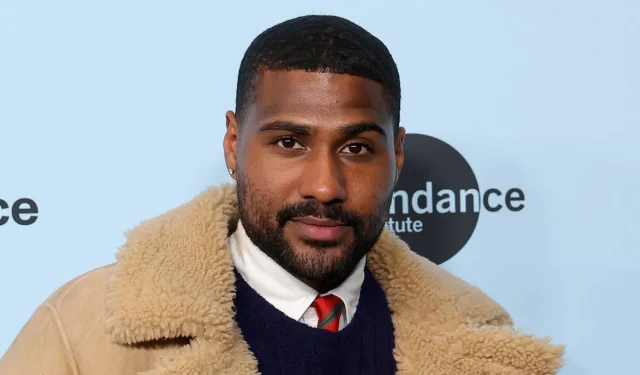Mark Anthony Green’s Directorial Debut: A Journey from Journalist to Filmmaker
Mark Anthony Green, affectionately known as “MAG,” has approached his feature film directorial debut with a profound sense of humility and gratitude. Originally from the Kansas City area, Green has transitioned from a successful career as a journalist at GQ to filmmaking, proving that passions can indeed evolve into reality.
Having spent over a decade honing his journalistic skills and interviewing prominent figures like LeBron James, Donald Glover, and Daniel Kaluuya, Green felt a growing urge to express himself through the medium of film. This led to his creation of the short film, Trapeze, U.S.A., in 2017. A few years later, he began crafting a psychological thriller entitled Opus, which will be releasing in theaters on March 14, thanks to A24.
A Collaborative Artistic Environment
Excitement radiated from Green throughout the filming process, motivating him to cultivate a collaborative and egalitarian atmosphere on set in Santa Fe. His commitment to respecting all individuals, from stars like Ayo Edebiri, John Malkovich, and Juliette Lewis to crew members and extras alike, was evident. One of the extras highlighted this culture in a comment about how Green often contributed by tidying up the set himself.
“When you’re making a small film, I would assume any director or leader would be like, ‘I’m in this with everybody. I’m going to help clean up,'” Green told The Hollywood Reporter. “Sometimes, I’d sweep up the glass [from a broken window], so another person could get a little bit of a break. I would sweep a thousand sets if it meant that I could get back on set.”
The Narrative of Opus
Opus tells the story of an exclusive album listening retreat hosted by the enigmatic pop star Alfred Moretti (portrayed by Malkovich). The film features a unique ensemble, including Edebiri’s character, journalist Ariel Ecton, who is drawn into the intricate dynamics surrounding Moretti and his devoted following, known as “Levelists.”This community exhibits cult-like properties and plays various roles within the secluded Utah compound.
“Many expect me to recount a specific interview that inspired Opus, but the film is fundamentally a cautionary tale about tribalism,” Green explained. “Pop music serves as a vibrant lens through which to examine this global phenomenon, which transcends art and entertainment,” he added.
Insights into the Film’s Creation
In a recent discussion with The Hollywood Reporter, Green reflected on various aspects of the filmmaking experience, including his transition from journalism to directing.
From Writing to Directing
After writing a short film, he realized his long-standing dream to produce feature films. “Those who knew me well were aware that this was my goal, though it was a surprise to colleagues who’d never heard me discuss it,” he shared.
Commentary on Print Media
A notable moment in the script touches on the divide within media, where one character questions another about the challenges facing print journalism—a relevant nod to current discussions about the industry’s evolution. Green, a self-described magazine enthusiast, believes in the enduring value of print media amid its struggles.
Homage to LeBron James
The film also includes a magazine cover featuring LeBron James, an intentional callback to Green’s own 2017 cover story for GQ. “I’m a huge fan of LeBron, so any opportunity to feature him is a win for me,” he remarked.
The Character of Ariel Ecton
Green’s connection to his protagonist, Ariel Ecton, is multifaceted. “Initially, I thought there wasn’t much of myself in her. However, friends noted several aspects that reflect my life and experiences,” he explained, highlighting the intrinsic nature of personal experiences just beneath the surface of storytelling.
Securing the Director’s Chair
Green candidly discussed the challenges of stepping into the director’s role, mentioning that it required considerable effort and perseverance, especially with the rise of new studios like A24 that champion emerging filmmakers. “It used to be a fight to get into the director position, but now there’s more opportunity for first-time filmmakers,” he noted.
Parallels to Celebrity Culture
Despite questions about whether his story was inspired by real-life events surrounding celebrities like Kanye West, Green clarified that while these events resonate with the film’s themes, they are not its foundation. “Opus explores tribalism in a fun yet profound way, using pop music to navigate these complex dynamics,” he explained.
Reflections on Journalism
Addressing potential misinterpretations of the film as anti-media, Green reinforced his respect for journalism. “The movie examines important societal issues, and I hold a deep respect for the role of journalists in public discourse, as I was one for 13 years,” he stated.
Gratitude Towards Influences
Green expressed heartfelt thanks to figures like Spike Lee, emphasizing the importance of acknowledging those who paved the way for Black filmmakers. He feels a special affinity for Lee, stating, “He fought to make space for Black films and storytellers, and every Black filmmaker should honor his contributions,” he said.
As Opus prepares to premiere, Green’s enthusiasm for returning to the film-making process is palpable. “I am excited to begin work on a new project. I have written an original script that’s different while also retaining my unique voice,” he shared.
Opus hits theaters on March 14.


